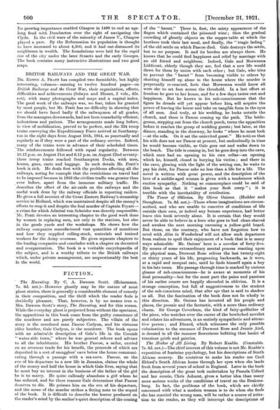The Tower of Oblivion. By Oliver Onions. (Hodder and Stoughton.
7s. 6d. net.)—Those whose imaginations are circum- scribed, and who are unable to conceive of conditions of life outside their own, .or indeed any human experience, had better leave this book severely alone. It is certain that they would never be able to believe in a hero who goes to bed clean-shaved and awakes the next morning caressing a yellow-gold beard. But those, on the contrary, who have not forgotten how to revel with Alice in Wonderland will not allow such departures from realism to spoil their enjoyment of a book that is in many ways admirable. Mr. Onions' hero is a novelist of forty-five. By means of some extraordinary mental process reacting upon the physical many Derwent Rose relives the last twenty-eight or thirty years of his life, progressing backwards, as it were, at a rapid and unequal rate, until he finds himself again a boy in his late teen's. His passage through time is marked by curious gleams of sub-consciousness—lie is aware at moments of his dual personality—but for the most part the pains and passions of his earlier course are happily shrouded in oblivion. It is a strange conception, but full of suggestiveness to the student of the sub-conscious mind; that alter ego that is said to shadow us all. But the fascination of the book does not lie wholly in this direction. Mr. Onions has invested all his people and places, the prosaic and the fantastic, with a more than ordinary charm. Sir George Coverham, the kind of fairy-godfather of the piece, who watches over the career of the bewitched novelist and relates his adventures, is an entirely sympathetic and attrac- tive person ; and Dinard, which witnesses the only possible culmination to the romance -of Derwent Rose and Jennie Aird, is dressed in all the summer floweriness befitting that haint of transient griefs and gaieties.


































 Previous page
Previous page